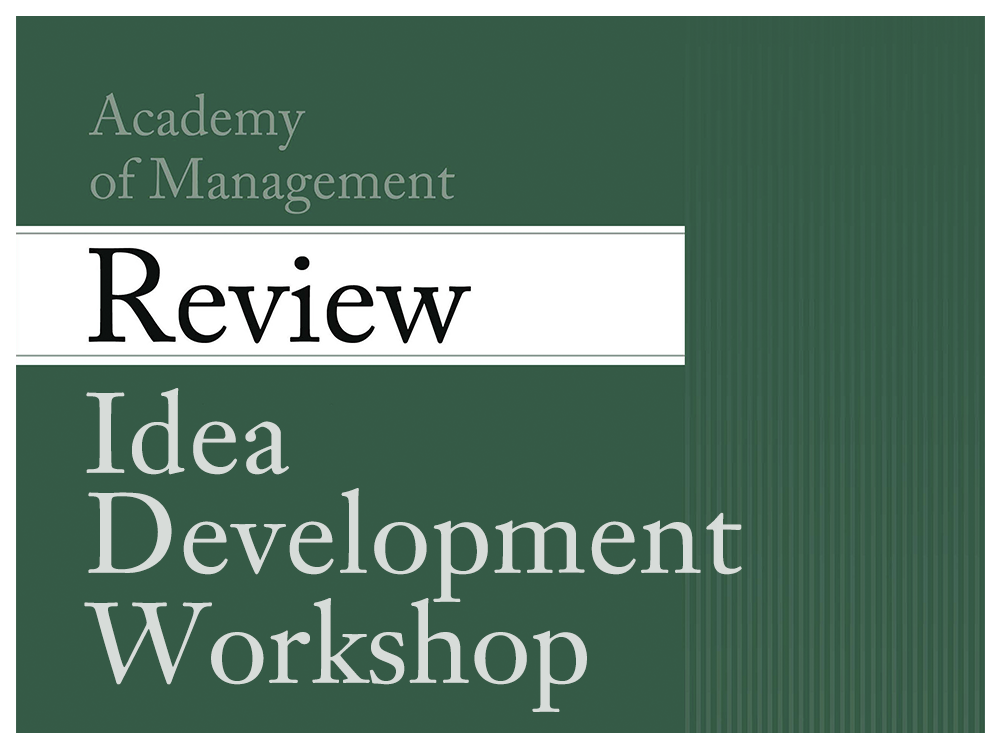AMR Idea Development Workshop
21 January 2020 to 11 March 2022
Deadline for extended abstracts: 18 February 2022, 12:00 EST (UTC-5/GMT-5)
The Editors of the Special Topic Forum (STF) on Theorizing Time in Management and Organizations will be hosting an idea development workshop in two parts. The first part will offer general guidance on the STF and publishing in the Academy of Management Review (AMR). The second part will engage authors in discussions about their proposed projects. The purpose of these workshops is to give authors an opportunity to develop and refine their ideas before submitting to the special issue. Participation in the workshop does not guarantee acceptance of the paper in the STF, nor is attendance in the workshop a prerequisite for submission of the proposal to the STF.
Part 1 Details
The first part will be held on 21 January 2022 from 10:00-12:00 EST (UTC-5/GMT-5). It will offer potential authors insights into the STF and exercises to sharpen their ability to write for AMR. The workshop will begin with welcome remarks by AMR editor, Sherry Thatcher, who will provide important general information about publishing in AMR. Next, guest editors will provide specific information about the Theorizing Time in Management and Organizations STF. This discussion will be followed by a discussion of exercises that authors can employ to improve their AMR submissions. As well, the guest editors will discuss some of the ways that time can be illustrated in figures. All authors submitting a short abstract will be welcome to attend this session.
The submission deadline has passed.
Part 2 Details
The second part is restricted to those people invited to attend, based on the suitability of their abstract. If your abstract is selected, you will be given an option to attend one of two sessions: 11 March 2022 at 8 am to 10 am EST or from 12 pm to 2 pm EST. In this session, guest editors and authors will discuss the abstracts in a roundtable format. Attendance will be restricted to two authors per submission if accepted for the workshop.
Submission requirements: After attending Part 1 and utilizing the suggested exercises, please submit an extended abstract by 18 February at 12:00 EST (UTC-5/GMT-5).
Outline your paper’s core ideas, foundational theories, and arguments. The file must not exceed 10 pages, inclusive of all text, figures, tables, and references. A good benchmark is that the body of your extended abstract may be 3-5 pages, much like an introduction to an AMR paper. All text must be 12-point font, one-inch margins, and double spaced. Please include all author information on the last page of the document and name your file using the first author’s last name, first initial, and an abbreviated title (e.g., “SmithK_Time and Sustainability.docx”). Each author can only submit one extended abstract as lead author.
Authors who submit for consideration to this Part 2 workshop will be notified of the decision to attend by 4 March 2022. There is a limited number of spots.
Further Considerations
In preparing your proposal submission, please read the Call for the Special Topic Forum. Additionally, read the following editorials:
- Barney, J. 2018. Editor's comments: Positioning a theory paper for publication. Academy of Management Review, 43(3): 345-348.
- Lange, D., & Pfarrer, M. D. 2017. Editor's comments: Sense and structure – the core building blocks of an AMR article. Academy of Management Review, 42(3): 407-416
- Makadok, R., Burton, R., & Barney, J. 2018. A practical guide for making theory contributions in strategic management. Strategic Management Journal, 39(6): 1530-1545.
The editorial team for this Special Topic Forum values diversity, inclusion, and equity in our global community. We encourage submissions that account for the full range of perspectives in management and organizations. Thus, we not only welcome submissions that have traditional perspectives, but also welcome submissions that bring new and different perspectives on management and organizations. These perspectives may be based on theoretical orientations that are under-represented, organizational and management phenomena that are outside the mainstream, or experiences and concerns of populations that are marginalized or hidden. In essence, we adhere to the belief that we cannot understand the full range of social experience until all social experience is represented in our scholarship.
If you have any questions, please contact any of the guest editors below:
